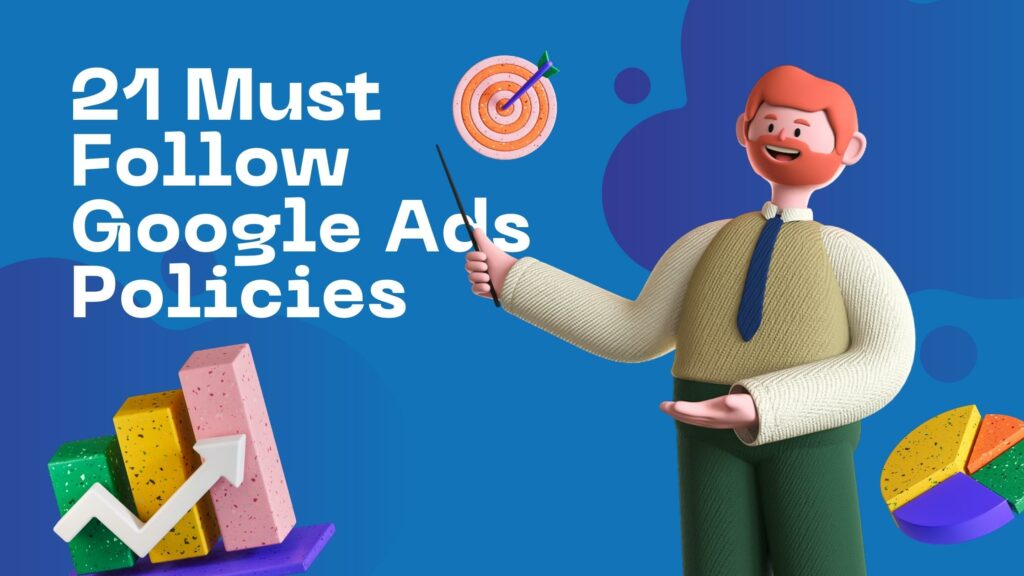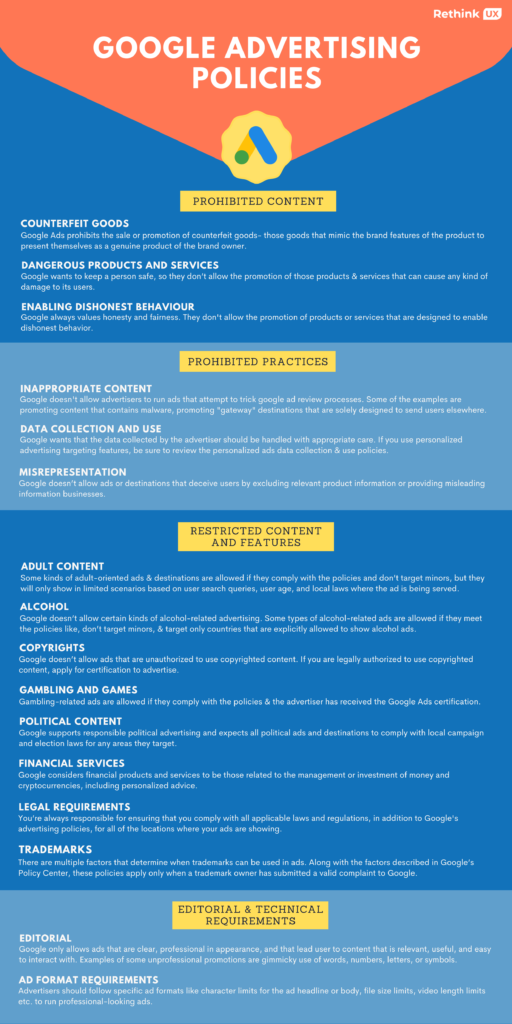
You must follow these 21 Google Ads Policies while creating google ads
Table of Contents
Google wants to have a healthy digital advertisement system which means it should be trustworthy, transparent, and works for all their users, advertisers and publishers.
The purpose of this article is to help you create google ads campaigns that aligns with google’s advertising policies.
Google uses a combination of automated and human evaluation to ensure Google Ads comply with these policies.

These advertising policies mainly talk about four areas
- Prohibited Content
- Prohibited Practices
- Restricted content and features
- Editorial and technical
- Prohibited Content
-
Counterfeit goods
Google Ads prohibits the sale or promotion of counterfeit goods. Counterfeit goods are those goods which mimic the brand features of the product to present themselves as a genuine product of the brand owner. This policy applies to the content of your ad, your website, and app. -
Dangerous products and services
Google wants to keep a person safe, so they don’t allow the promotion of those products and services that can cause any kind of damage to their users. Some examples of such goods are: Recreational drugs (chemical or herbal), weapons, ammunition, explosive materials & fireworks, and tobacco products etc. -
Enabling dishonest behaviour
Google always values honesty and fairness. They don't allow the promotion of products or services that are designed to enable dishonest behavior. Some of the examples are: Hacking software or instructions, services designed to bring fake website traffic; academic cheating services etc.
Prohibited Practices
- Inappropriate content
Google doesn't allow advertisers to run ads, content, or destinations that attempt to trick google ad review processes. Some of the examples are: promoting content that contains malware, promoting "bridge" or "gateway" destinations that are solely designed to send users elsewhere.
- Data collection and use
Google wants that the data collected by the advertiser should be handled with appropriate care. If you use personalized advertising targeting features, be sure to review the personalized ads data collection and use policies. Some examples are: phone number; national identity, pension, social security, tax ID, health care, etc.
- Misrepresentation
Google doesn’t allow ads or destinations that deceive users by excluding relevant product information or providing misleading information about products, services, or businesses.
Some examples are: making misleading or unrealistic claims regarding weight loss or financial gain, falsely purporting to be a reputable company in order to get users to part with valuable personal or financial information etc.
Restricted content and features
These promotions may not show to every user in every location, and advertisers may need to meet additional requirements before their ads are eligible to run. Note that not all ad products, features, or networks are able to support this restricted content.
- Adult Content
Some kinds of adult-oriented ads and destinations are allowed if they comply with the policies below and don’t target minors, but they will only show in limited scenarios based on user search queries, user age, and local laws where the ad is being served. Some examples are: strip clubs, erotic cinemas, sex toys, adult magazines, etc.
- Alcohol
Google doesn’t allow certain kinds of alcohol-related advertising, both for alcohol and drinks that resemble alcohol. Some types of alcohol-related ads are allowed if they meet the policies like, don’t target minors, and target only countries that are explicitly allowed to show alcohol ads. Some examples are: beer, wine, sake, spirits or hard alcohol, Champagne, etc.
- Copyrights
Google doesn’t allow ads that are unauthorized to use copyrighted content. If you are legally authorized to use copyrighted content, apply for certification to advertise.
- Gambling and games
Gambling-related ads are allowed if they comply with the policies below and the advertiser has received the proper Google Ads certification. Gambling ads must target approved countries, have a landing page that displays information about responsible gambling, and never target minors. Some examples are: physical casinos, sites where users can bet on poker, bingo, roulette, or sports events etc.
- Healthcare and medicines
Google is dedicated to follow advertising regulations for healthcare and medicine, so they expect that ads and destinations follow appropriate laws and industry standards. Some healthcare-related content can’t be advertised at all, while others can only be advertised if the advertiser is certified with Google and targets only approved countries.
- Political content
Google supports responsible political advertising and expects all political ads and destinations to comply with local campaign and election laws for any areas they target. Some examples are: promotion of political parties or candidates, political issue advocacy.
- Financial services
Google considers financial products and services to be those related to the management or investment of money and cryptocurrencies, including personalized advice. When promoting financial products and services, you must comply with state and local regulations for any region or country that your ads target — for example, include specific disclosures required by local law.
- Trademarks
There are multiple factors that determine when trademarks can be used in ads. Along with the factors described in Google’s Policy Center, these policies apply only when a trademark owner has submitted a valid complaint to Google.
- Legal requirements
You’re always responsible for ensuring that you comply with all applicable laws and regulations, in addition to Google's advertising policies, for all of the locations where your ads are showing.
- Other restricted businesses
If google feels that certain kinds of businesses pose an unreasonable risk to user safety or user experience, then they may limit or stop related ads from running. Based on Google’s continuous reviews, and feedback from users, regulators, and consumer protection authorities, they occasionally identify products or services that are prone to abuse.
- Restricted ad formats and features
Certain ad formats are not available for all advertisers until they meet google’s specific requirements or complete the certification process.
Now what is certification here?
Certification may include providing documentation, such as supporting licenses and identification documentation to confirm that you are authorized to have access to the product features, or that you have demonstrated a sustained history of policy compliance for some time.
- Requirements made for kids content
Advertisers can not run personalized ads on content sets made for kids. See here for categories restricted for advertising on made for kids content.
Editorial & technical requirements
Google wants to deliver ads that are engaging for users without being annoying or difficult to interact with, so they have developed editorial requirements to help keep your ads appealing to users.
- Editorial
Google only allows ads that are clear, professional in appearance, and that lead users to content that is relevant, useful, and easy to interact with. Examples of some unprofessional promotions are: overly generic ads that contain vague phrases such as "Buy products here" and gimmicky use of words, numbers, letters, punctuation, or symbols such as FREE, f-r-e-e, and F₹€€!!
- Destination requirements
Google wants consumers to have a good experience when they click on an ad, so ad destinations must offer unique value to users and be functional, useful, and easy to navigate.
Examples of promotions that don't meet destination requirements:
- A display URL that does not accurately reflect the URL of the landing page, such as "google.com" taking users to "gmail.com"
- Sites or apps that are under construction, parked domains, or are just not working
- Sites that are not viewable in commonly used browsers
- Sites that have disabled the browser's back button
- Ad format requirements
Advertisers should follow specific ad formats like character limits for the ad headline or body, image size requirements, file size limits, video length limits, aspect ratios etc. to run professional-looking ads.
Final Notes
These were some basic google ad policies that you should take care about before creating any type go google ads. Follow these policies to get your ads reviewed fast.
